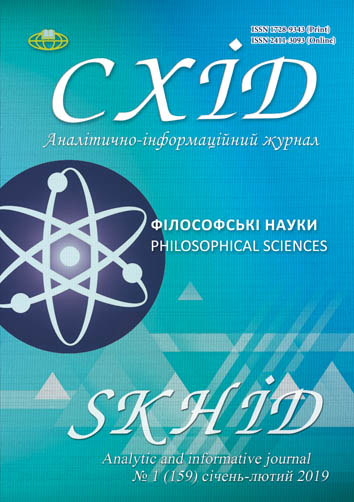Philosophy in the digital epoch: potential development and challenges
DOI:
https://doi.org/10.21847/1728-9343.2019.1(159).157449Keywords:
digital philosophy, digital humanistic, digitalizationAbstract
The world of digital technologies is reformatting socio-humanitarian knowledge, in which digital humanities are actively developing, bringing together the hard sciences and humanities. It began to take shape form in the middle of the XXth century, and due to digital humanities, traditional philosophical questions received new perspectives also. The huge amount of digitized information does not simplify, but often complicates the search for true knowledge, pushing to epistemological pessimism. Blurring the boundaries between the physical world and the computer virtual environment in a new way raises the ontological question of reality itself and its boundaries. The ability to create a new person (s) in a virtual environment often causes not only psychological, but also axiological problems, contributes to the crime of ethical norms, and leads to alienation between people. In the field of philosophical anthropology, the gradual cyborgization of society modifies the question of the essence of man (Transhumanism, etc.). A new branch of philosophical knowledge, digital philosophy, is developing actively. It can be interpreted in two directions: simple digitization of philosophical texts and visualization of philosophy or an interdisciplinary field at the intersection of metaphysics and cosmology. All the above allows us to speak about the formation of new vectors of philosophical knowledge: media philosophy, digital philosophy, etc.Downloads
References
Glazer, P. (2012). Google almighty. Chip, № 3, P. 43-45. (In Russian)
Lysenkova, A. A. (2017). The philosophy of aggression in the digital age. Filosofskie nauki, № 6, P. 137-147. Retrived from https://publications.hse.ru/mirror/pubs/share/direct/212164058 (In Russian)
Makulin, A. V. (2016a). Intellectual systems in the humanitarian sphere and digital philosophy. Vestnik Severnogo (Arkticheskogo) federalnogo un-ta. Gumanitarnye i sotsialnye nauki, № 2, P. 76-86. DOI: 10.17238/issn2227-6564.2016.2.76 (In Russian)
Makulin, A. V. (2016b). Modeling of Philosophy: From Schemes, Tables and Metaphors to Digital Philosophical Visualizations. Gramota, № 3 (65): V. 2 ch., Ch. 1, P. 123-127. Retrived from www.gramota.net/materials/3/2016/3-1/28.html (In Russian)
Mozhaeva, G. V., ed. (2016). Digital Humanities: humanities in the digital age. Tomsk: Izd-vo Tom. un-ta, 120 p. Retrived from http://vital.lib.tsu.ru/vital/access/services/Download/vtls:000576579/SOURCE1 (In Russian)
Taller, M. (2012). Discussions around digital humanities. Istoricheskaya informatika, № 1, P. 5-13. Retrived from http://kleio.asu.ru/2012/1/hcsj-12012_5-13.pdf (In Russian)
Yaroslavtseva, Ye. I. (2009). Digital Space Philosophy. Gumanitarnye chteniya RGGU-2008. Konferentsii. Nauchnye seminary: Sb. materialov. Moskva: RGGU. P. 71-89. Retrived from https://iphras.ru/page50061268.htm (In Russian)
Dalbello, M. (2011). A Genealogy of Digital Humanities. Journal of Documentation, 67 (3), P. 480-506. DOI: 10.1108/00220411111124550 (In English)
Fredkin, E. (2003). An Introduction to Digital Philosophy. International Journal of Theoretical Physics, Vol. 42, № 2, Р. 189-247. Retrived from http://52.7.130.124/wp-content/uploads/2015/07/intro-to-DP.pdf (In English)
Heershman Leeson, L. (1996). Clicking in: Hot Links to a Digital Culture. Seattle: Bay Press. 371 р. Retrived from https://monoskop.org/File:Leeson_Lynn_Hershman_ed_Clicking_In_Hot_Links_to_a_Digital_Culture_1996.pdf (In English)
Kasza, J. (2017). Post Modern Identity: «In Between» Real And Virtual. World Scientific News, № 78, Р. 41-57. Retrived from http://www.worldscientificnews.com/wp-content/uploads/2017/05/WSN-78-2017-41-57.pdf (In English)
Keen, A. (2007). The Cult of the Amateur: How Today’s Internet Is Killing Our Culture. NY: Doubleday. 228 р. Retrived from https://filmadapter.files.wordpress.com/2014/10/andrew_keen_the_cult_of_the_amateur_how_todaysbookfi-org.pdf (In English)
Terras, M. (2006). Disciplined: Using Educational Studies to Analyse “Humanities Computing”. Literary and Linguistic Computing, № 21 (2), Р. 229-246. DOI: 10.1093/llc/fql022 (In English)
Terras, M., Nyhan, J., Vanhoutte, E. (2013). Defining Digital Humanities: A Reader. S. l.: Ashgate Publishing Ltd. 331 p. Retrived from: http://ccftp.scu.edu.cn/Download/505594d1-330f-4831-94a1-ec87d218345a.pdf (In English)
Downloads
Published
How to Cite
Issue
Section
License
Copyright (c) 2019 Mariya Chikarkova

This work is licensed under a Creative Commons Attribution-NonCommercial-NoDerivatives 4.0 International License.
1. Authors bear responsibility for the accuracy of facts, quotations, numbers and names used.
2. Manuscripts are not sent back.
3. The publisher does not always agree with the authors' opinion.
4. The authors reserve the right to authorship of the work and pass the first publication right of this work to the journal under the terms of a Creative Commons Attribution-NonCommercial-NoDerivatives 4.0 International License. This license allows others to distribute (copy) the published work for non-commercial purposes, provided there is mandatory attribution to its authors and a link to the first publication in our journal.
5. The authors have the right to conclude separate supplement agreements that relate to non-exclusive work distribution in the form in which it has been published by the journal (for example, to upload the work to the online storage of the journal or publish it as part of a monograph), provided that the reference to the first publication of the work in this journal is included.

